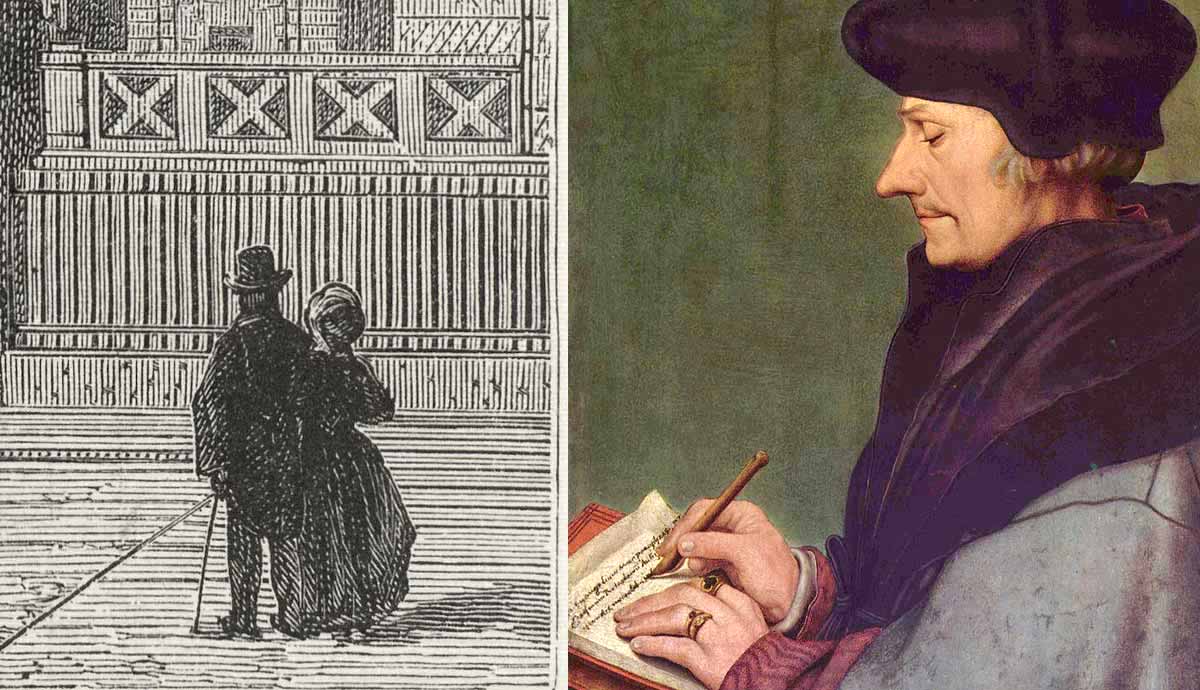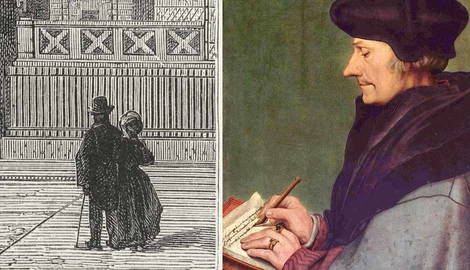
Desiderius Erasmus is generally considered to be one of the most influential thinkers of the Renaissance. He was a highly intelligent man of letters who wrote constantly during his lifetime, producing educational handbooks, dialogues, religious treatises and writing treatises that dealt with many of the period’s most prominent theological and philosophical issues. Erasmus also traveled widely around Europe and met with leading thinkers of the day in person.
Who was the man behind all the letters? In this article, we take a look at Erasmus’ early life and education, as well as his travels around Europe, his dealings with Martin Luther, and his legacy today.
Early Life and Education

Erasmus was born in Rotterdam in 1467. Although he was the illegitimate son of a priest, Erasmus received a decent education for a young boy in the late 15th century. He first attended a school in Deventer, Netherlands which was known for its progressive education. However, by 1483, Erasmus had lost both his parents. They left him very little in the way of inheritance, so he was persuaded by his living guardians to enter a monastery at Steyn. Erasmus was officially ordained in 1492.
There is plenty of evidence to suggest that Erasmus regretted this decision in later life. Not least due to the publication of a work entitled De Contemptu Mundi (On Disdaining the World) in 1521 which criticizes the seclusion of monastic life. Erasmus also claimed that he had felt pressured into taking his vows and soon realized he wasn’t cut out to be a monk.
Despite these regrets, and the requirements of his new profession, Erasmus managed to carve out an academic life for himself. In 1495, Bishop Hendrik of Bergen sent him to the Collège de Montaigu in Paris. Erasmus was unhappy with the teaching at the college and instead supported himself financially by tutoring young (often wealthy, upper class) students. Erasmus produced some of his most well-known works during this time, including Adagia (1500), a collection of proverbs, and De Copia (1502), a handbook on writing style.

Erasmus grew up to become a devout Christian who was deeply interested in Classical Roman and Greek thought. As a result, he is often labeled a ‘Christian Humanist’ i.e. someone who blended Christian Scripture with classical philosophical traditions. Erasmus was also extremely committed to the idea that education was key to raising humans up from mere brutes to intelligent and knowledgeable beings. Unlike the major Reformers of the day, Erasmus believed that it was the responsibility of individuals to learn the biblical languages Hebrew, Ancient Greek and Latin in order to study the original Scripture.
Erasmus tried his best to stay out of politics and is known for his strong reluctance to engage with Martin Luther and the resulting theological disputes that emerged from the Reformation. Erasmus preferred to promote reconciliation and compromise over polemical attacks. During his lifetime, he was claimed by both the early Reformers and the Catholic Church, before eventually coming down on the side of Catholic doctrine regarding issues such as free will.
Travels Around Europe

Erasmus was not one to sit still for too long. In 1499, one of his pupils, William Blount, invited Erasmus to England. During this time, he met Thomas More, the famous English lawyer, judge and philosopher. The two men quickly got on and ended up becoming friends for life.
Erasmus continued to develop his own world view during this period in England. He had hated the traditional Christian scholastic education offered at the Collège de Montaigu and instead aimed to teach and interpret Scripture in the manner of the early Church fathers such as St. Jerome. This style of teaching included a heavy emphasis on the art of rhetoric. Erasmus was also convinced that in order to practice this “ancient theology” he would need to master the Ancient Greek language.

Despite English academics urging him to stay and teach, Erasmus continued to travel around Europe. In Artois, France he met the firebrand cleric Jean Voirier, who introduced Erasmus to the works of Origen, an early Christian writer who was influenced by Plato. By 1502, Erasmus was living in Leuven, Belgium and writing his own meditations on scripture. The most famous was the Enchiridion militia Christiani (which translates as Handbook of a Christian Knight). He used this text to urge people to interpret Scripture through the lens of ancient philosophers, while also asserting that living a monastic life didn’t necessarily equate to Christian piety.
Erasmus returned to England in 1505, but was soon given the opportunity to go to Italy and tutor the sons of the future Henry VIII’s personal physician. Erasmus arrived in Bologna, the renowned university town, in 1506, just as Pope Julius II entered the city at the head of a triumphant Papal army. He also spent time in Venice, where he expanded the Adagia to include over 3,000 ancient Greek and Latin proverbs or adages.
Erasmus, Martin Luther and the Reformation

Erasmus lived through one of the most dramatic periods in the history of Christianity. Martin Luther instigated the Reformation with his famous Ninety Five Theses in 1517, and a massive schism between the Catholic Church and new Christian sects such as Lutheranism and Protestantism began to emerge. Luther challenged the authority of the Pope, rejected the Catholic practice of indulgences and translated the Bible from Latin into German.
Some Catholic scholars blamed Erasmus for inspiring Luther, a claim supported by many of Luther’s own admirers, who felt the young German scholar was merely saying out loud what Erasmus had long hinted at in his own teachings. Erasmus and Luther certainly agreed on many things, with Erasmus even describing Luther in a letter to Pope Leo X as “a mighty trumpet of Gospel truth.”
Erasmus interpreted the break between Luther and the Catholic Church as a criticism of the power of clerics and various Catholic rituals of worship (which often had little to no basis in Scripture). He recognized that ordinary lay people resented being forced to perform these rites, all the while being told they would go straight to Hell if they didn’t obey. Erasmus wanted the Church to reunite, but for this to happen he felt that the Catholic order needed to relax some of its notoriously strict rules, including allowing priests to marry.
Erasmus eventually became stuck in the middle of the Reformation. He spent a lot of time in later life denying that his works had inspired Luther, while simultaneously refusing to unequivocally support either side. In an era where bloody religious warfare was rife across Europe, this position became extremely difficult to maintain. A mild-mannered criticism of Luther published in 1524 failed to convince Catholics that Erasmus was on their side.
Erasmus’ Later Life and Legacy

Erasmus spent the later years of his life in lonely pursuit of a middle ground between the Catholic Church and the Reformers. As an old man, he accepted an invitation from Queen Mary of Hungary to stay in Freiburg. However, he died en route in Basel from a fatal attack of dysentery. It’s unclear whether or not he requested the last rites on his deathbed. According to Erasmus’ friend Beatus Rhenanus, his last words were “Dear God”. He is buried in the Basel Minster.
The value and worth of Erasmus’ life and teaching only really began to be recognized in the 17th century, once the bloody religious wars of the 16th century had finally settled. Scholars such as Richard Simon and Jean Le Clercq helped this revival, alongside Enlightenment thinkers who preferred to emphasize Erasmus as someone who had cleverly anticipated the Catholic Church’s downfall.
More recently, scholars have recognized that Erasmus’ views were much more complicated than this. He remained committed to preserving the Church as it had been pre-Reformation but wanted people to study Christianity with a better understanding of its ancient roots. He was critical of Catholic institutions yet didn’t agree with Luther on everything either.
Erasmus is remembered today as a prominent and influential intellectual who lived through one of the most turbulent ages in the history of Christianity. His love of travel is commemorated through the European Union’s Erasmus+ exchange program, which gives languages students the chance to study abroad for a year during their studies. He is also fondly remembered in his hometown of Rotterdam, and several educational institutions bear his name to this day.










